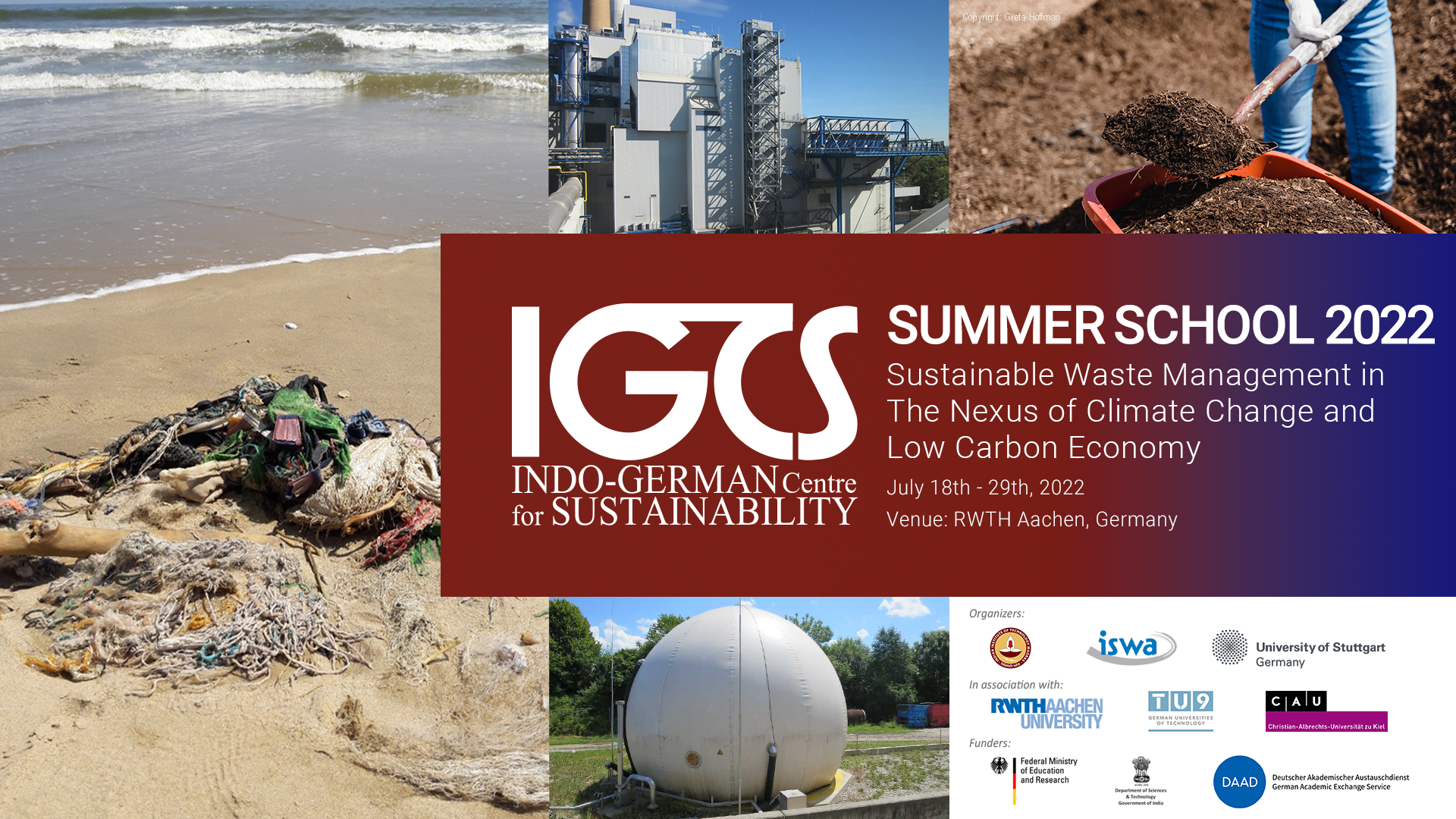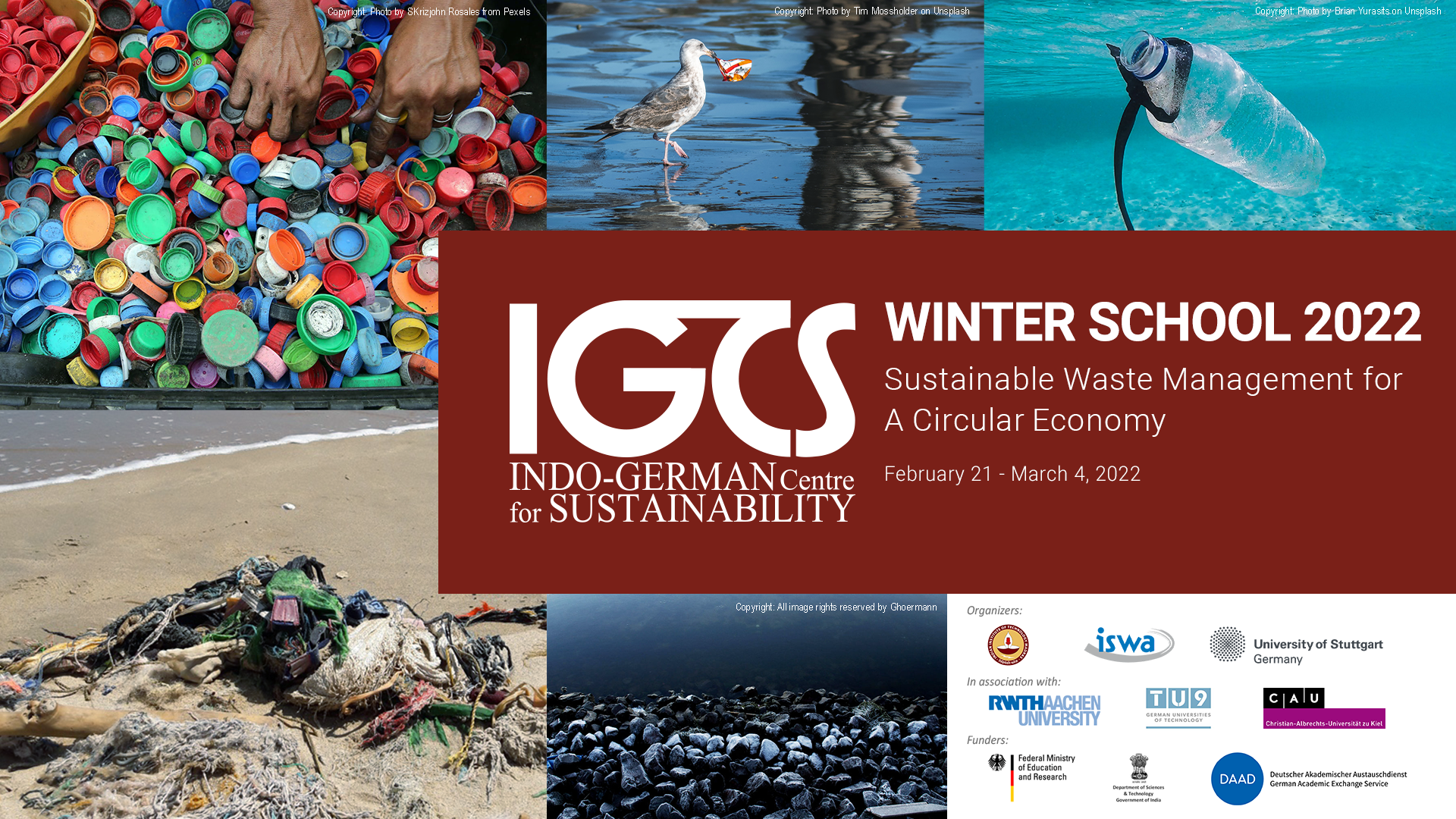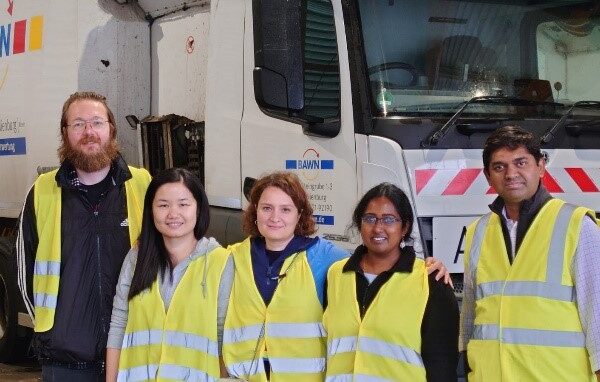
At IGCS, the focus area of Sustainable Waste Management emphasized the development of management strategies and technological processes through transdisciplinary research. This approach incorporated the principles of the circular economy, reuse, recycling, energy recovery, and climate change, targeting both organic and inorganic waste relevant to Indian cities and the global context. Key research areas included the potential of organic waste, waste separation, composting, biogas production, and thermochemical processes, along with assessing the impacts of plastic waste in coastal urban areas and strategies for its reduction, reuse, and recycling.
Research Projects
IGCS’s waste management research in Chennai, India, focused on reducing, reusing, and recycling plastics to support a circular economy and environmental protection. Using thermochemical technologies and pilot-scale reactors at IIT Madras, researchers evaluate plastic waste for conversion into valuable resources. Collaboration with IIT’s Humanities and Social Sciences department addresses sustainable waste management in peri-urban areas, aiming to develop local strategies. Efforts in bioeconomy are fostering German-Indian cooperation, with adaptations to India’s socio-economic diversity underway. Training programs emphasize integrated waste management and climate resilience, offering seminars, lectures, and seasonal schools to foster sustainable waste management innovation. Research on waste and coastal infrastructure is also part of a DST project at IIT Madras.
“RESERVES” project
The “RESERVES” project aims to improve resource and energy reliability by exploring the co-digestion of vegetable market waste and slaughterhouse waste for biogas production. Organic waste streams like these have significant potential as renewable energy sources when processed efficiently. By combining these two waste types, the project seeks to optimize anaerobic digestion processes to enhance biogas yield and overall energy output. This approach not only addresses the challenge of managing large volumes of organic waste but also supports the transition toward sustainable energy solutions.
The project investigates the synergistic effects of co-digestion, focusing on balancing nutrient content, improving digestion efficiency, and minimizing process inhibition. Slaughterhouse waste is rich in energy but requires careful handling due to its high nitrogen content, while vegetable market waste provides a complementary carbon source. By combining these materials, the study aims to develop a more stable and efficient process that reduces dependency on fossil fuels. Additionally, this initiative contributes to waste reduction, resource conservation, and the production of clean energy, aligning with broader environmental and sustainability goals.
PYRASOL project
The PYRASOL project focuses on developing an integrated solution for energy supply, carbon sequestration, and treatment of urban organic waste. The project combines solar sludge drying and pyrolysis technologies to efficiently manage organic waste in the context of smart cities. By harnessing solar energy for sludge drying, the system reduces the moisture content of organic waste, making it suitable for pyrolysis—a thermal decomposition process that converts waste into biochar and syngas. This approach simultaneously provides clean energy, reduces greenhouse gas emissions, and contributes to carbon sequestration through the production of stable biochar.
The project addresses key challenges in urban waste management by integrating renewable energy use with advanced waste treatment technologies. Biochar, a byproduct of pyrolysis, can be used as a soil amendment, enhancing soil quality and sequestering carbon over the long term. The generated syngas can be utilized as a renewable energy source, supporting the energy needs of smart cities. Through this innovative system, PYRASOL promotes a circular economy model, offering sustainable solutions for waste treatment, energy production, and climate change mitigation.
Teaching
IGCS Summer School 2022
To reach net-zero emissions by 2050, nations are prioritizing defossilization, circular economies, nature-based solutions, energy efficiency, and waste reduction. Sustainable waste management plays a central role, requiring integrated approaches that include technological, regulatory, and socio-economic considerations. The IGCS Summer School explores how waste management supports clean energy, emissions cuts, and ecosystem restoration, focusing on composting, plastics upcycling, municipal waste treatment, and industrial recycling. It unites Indian and German students to develop skills in circular economy practices and propose innovative, climate-friendly waste solutions.

IGCS Winter School 2022
Current linear production and consumption are straining environmental resources, creating excessive waste and exceeding management capacities. Circular approaches that transform “waste-to-wealth” are essential for sustainability, pollution reduction, and ecosystem protection. Sustainable waste management supports a circular economy, emission reduction, and societal well-being. The IGCS Winter School focuses on municipal, plastic, and industrial waste management, as well as wastewater reuse, with Indian and German experts sharing best practices. Students will gain skills in waste-to-value processes, evaluate recovery technologies, and propose innovative, circular solutions.

Activities
IGCS Organized Indo-German Workshop with IIT and CSIR-CLRI
Field visit by IGCS focus area “WASTE” team
Sustainability and Waste Management of The RWTH India Alumni Insights Event Series
Leibniz Universität Hannover is IGCS new Partner University
EU-India research perspectives on Plastic Waste
Publications
Research projects are one of IGCS’ supporting pillars and are reflected by numerous workshops, meetings, and project proposals. Cooperation in research projects goes beyond the IGCS partner universities and we regularly work together with various German and Indian institutions.
Reports/Books Chapters
20
Journal Articles
100
Conference Proceedings
63
Media Productions
Lab Videos
Immerse yourself in the forefront of scientific research with IGCS Lab Video Series. Our videos feature IGCS scholars and researchers showcasing their focus in their respective scientific fields. Explore our latest playlist to find a wealth of information and inspiration from the academic community.








